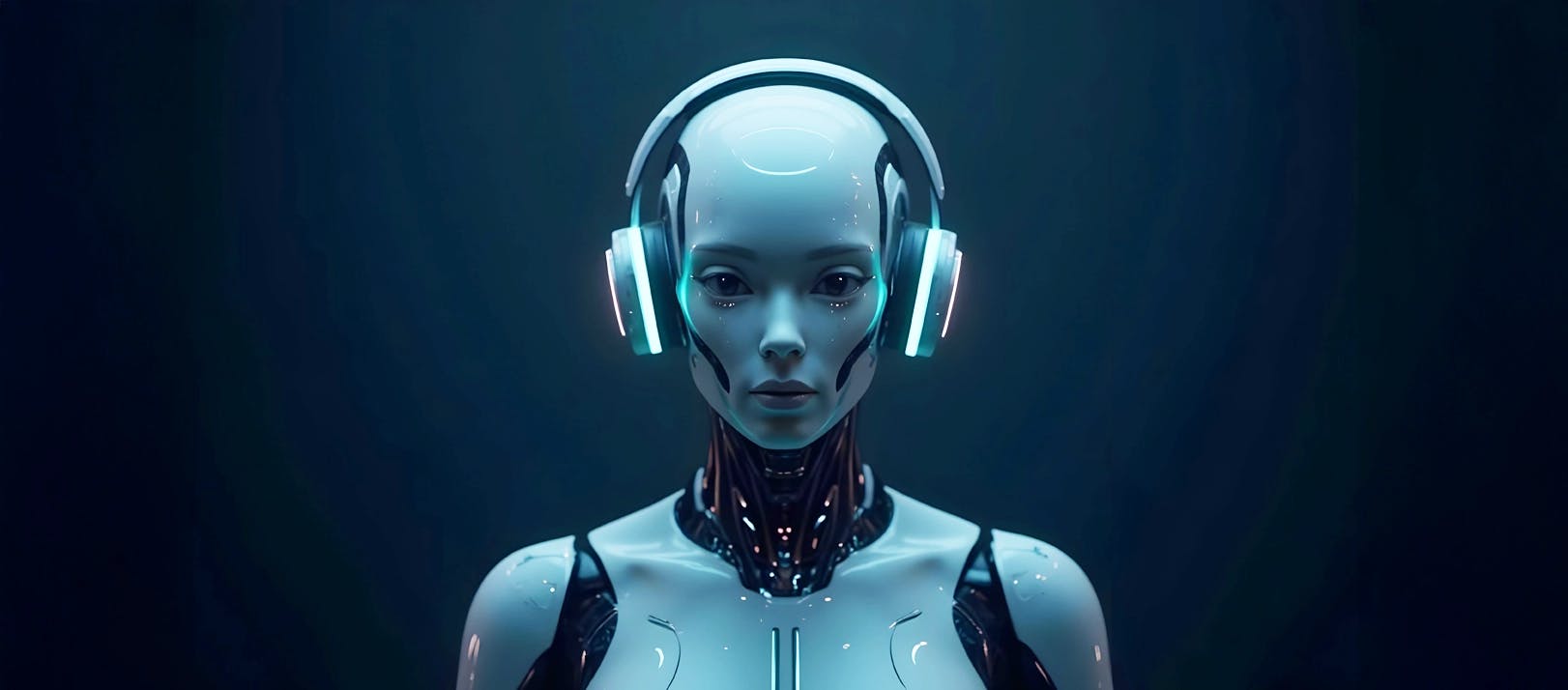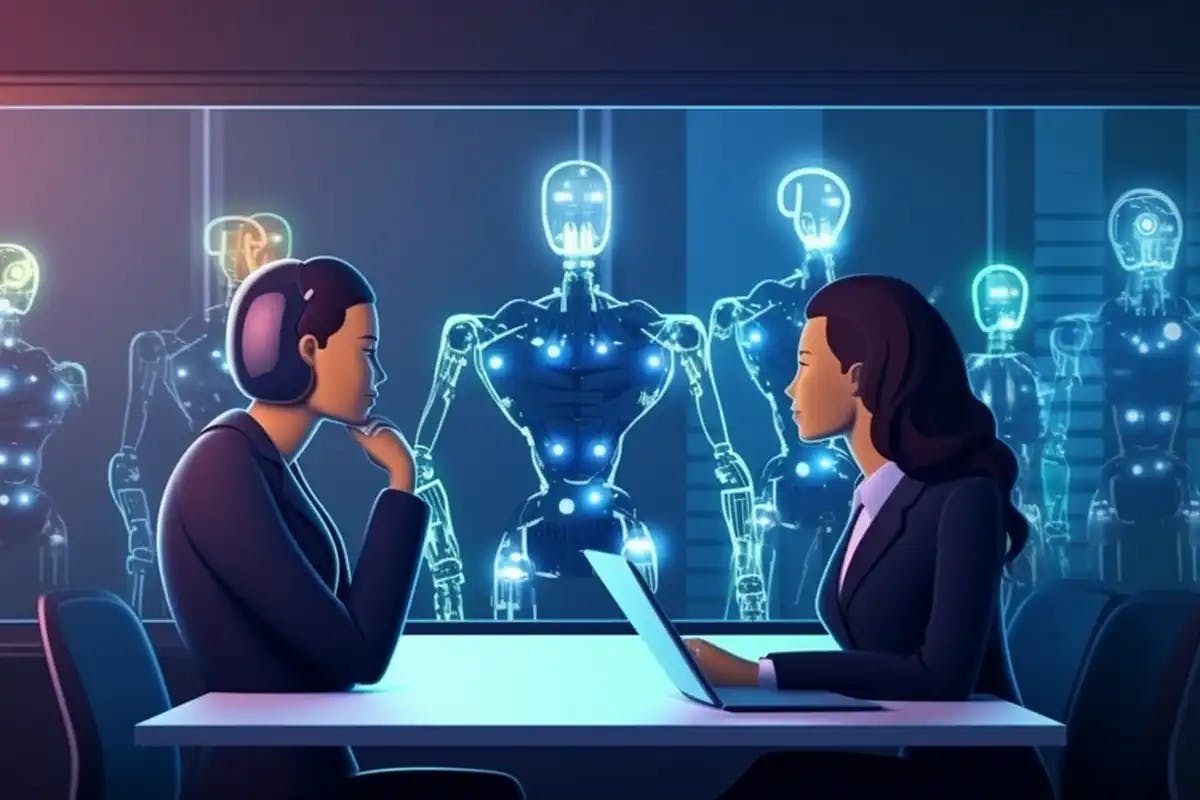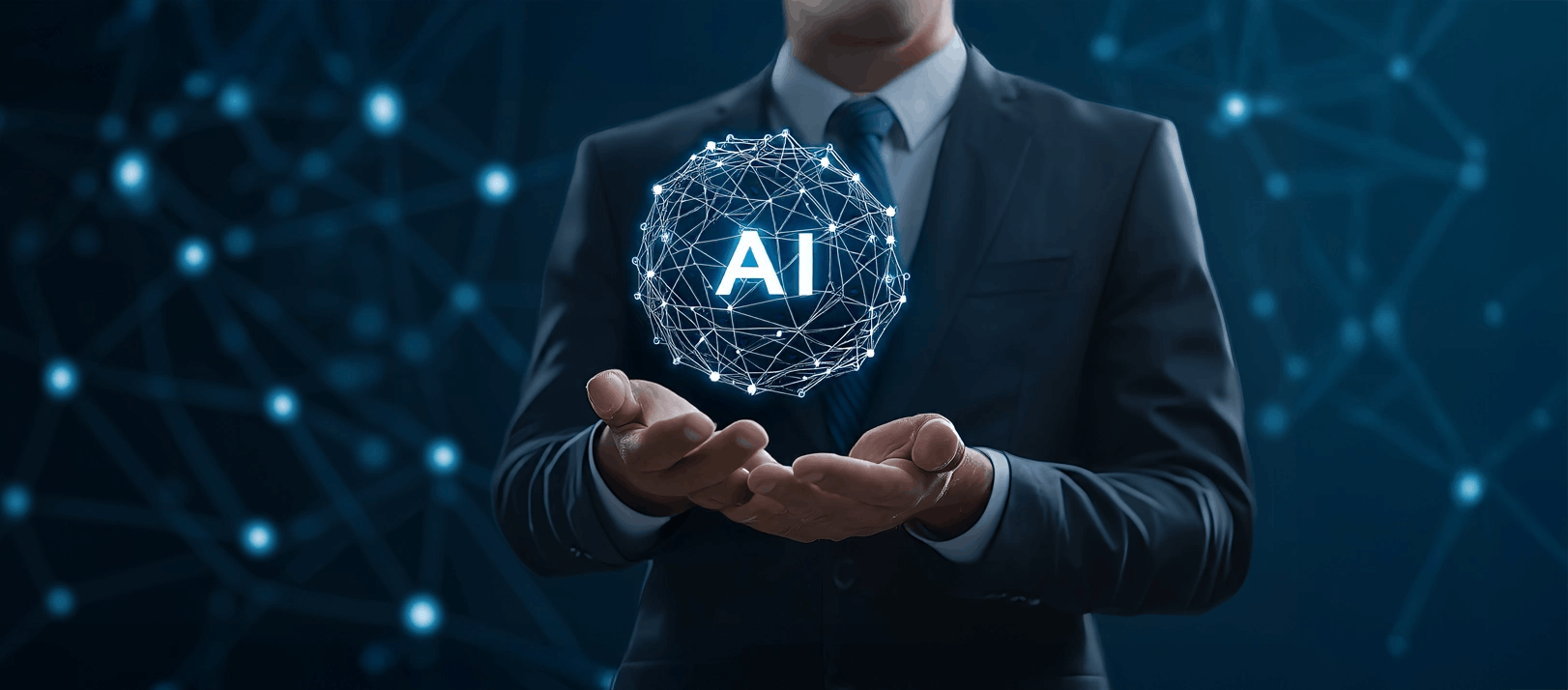
Top 6 HR Use Cases of Generative AI in 2025
Artificial Intelligence (AI) is poised to reshape and change the future of all industries; the HR industry is not an exception to it. The human resources industry is already disrupted with the introduction of Gen AI as it delivers established views on work, talent, roles, and skills. As the amount of resumes received by companies for a job is increasing, they are seeking efficient ways of handling the recruitment process through AI-driven technology.
The latest trends and AI in HR statistics show that HR management is heavily driven by AI. The HR market for AI is rising rapidly and it is estimated to reach USD 17.61 billion by 2027.
Nearly 67% of HR professionals strongly believe Artificial Intelligence in Human Research management will have a positive impact on the recruitment and screening process. Also, about 80% of HR leaders predict AI in human resources will advance soon and become a strong tool for hiring and firing employees/candidates.
This article elaborates on how generative Artificial Intelligence in HR management nurtures the HR industry along with a few expert tips for the successful implementation of Gen AI in HR.
Top 6 Use Cases of Generative AI in HR
The synergy between generative AI and HR is reforming the setting of the workplace. The companies that use AI applications in human resources not only optimize their operational effectiveness, but also motivate the customs of constant enhancement, flexibility, and employee centricity, which assure constant success in an ever-growing business backdrop.
Gen AI in HR is transforming the way companies administer their work styles. With applications ranging from recruiting to employee growth and more, generative AI in decision-making process is proving to be a game-changer in the HR domain.
Let’s take a look into the top six use cases of generative AI in HR, finding their impact, and giving some examples of their practical implementation.
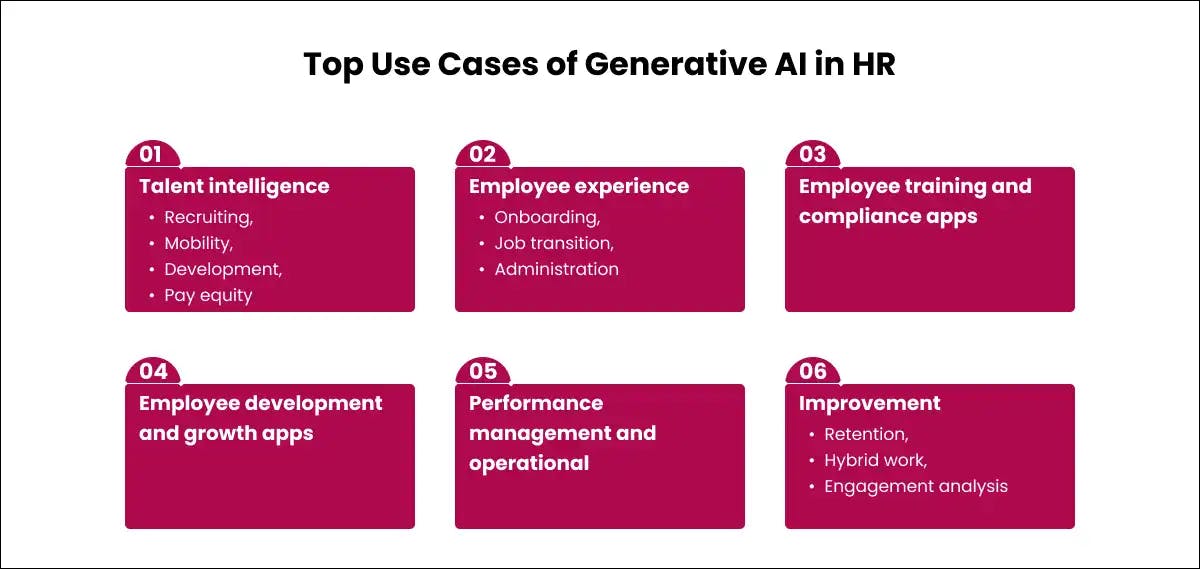
1. Talent intelligence for recruiting, mobility, development, pay equity
Generative AI in HR influences highly developed algorithms to examine huge datasets, giving a valuable approach to talent intelligence. This typically includes expecting the success of the applicant; evaluating the mobility of the employee, finding growth opportunities, and assuring reimbursement justice within the company.
The AI applications in HR can foresee the possibility for the success of applicants depending on the performance metrics and historical data. Pay impartiality is powered by AI algorithms that assure fair recompense, and motivate the comprehensive and various workplaces. AI Agents can enable Human Research professionals to identify the possible skill gaps in a workforce and make possible the targeted training programs.
2. Employee experience apps for onboarding, job transition, administration
Generative AI alters the experience of employees by streamlining the processes including administration, job changes, and onboarding. Automating the regular tasks, HR experts can mainly concentrate on making more effective and personalised experiences for the employees.
AI-driven onboarding applications can guide new hires via personalised orientation programs, and also improve their incorporation into a company custom. Administrative tasks such as document processing and leave management are becoming simpler via AI applications and enhancing complete employee satisfaction.
During the job changeovers, AI helps in matching the employees with appropriate roles depending on their choices and skills.
3. Employee training and compliance apps
Gen AI in HR always plays an ultimate role in fulfilment and employee training by providing the learning experiences to individual requirements and also ensuring obedience to regulatory needs.
AI applications examine the performance data of employees to suggest some tailored training elements and also deal with particular skill gaps. The conformity apps powered by Generative AI in HR can computerise the documentation and tracking of employee certifications and reduce the danger of non-conformity.
4. Employee development and growth apps
Generative AI authorises employees in their professional growth by recognizing the growth opportunities and suggesting some career paths supported by their ambitions.
AI-driven mentorship programs can connect algorithms with mentors depending on compatibility, and motivating the customs of consistent learning. The personalised growth strategies made by AI algorithms can guide employees in obtaining the skills required for career improvement.
5. Performance management and operational improvement
The Gen AI Applications in Human Resources can improve the management of performance by giving real-time comments and recognizing the areas for operational enhancement.
The operational effectiveness is intensified as AI recognizes bottlenecks and recommends some process optimizations that lead to enhanced production. Generative AI examines the performance metrics to provide prompt comments to employees and give ongoing enhancement.
6. Retention, hybrid work, well-being, engagement analysis
Gen AI in HR tackles the vital elements including managing the models of hybrid work, employee maintenance, examining the commitment levels, and promoting comfort within the company.
Usually, the hybrid-work models are optimised by using AI algorithms and assuring flawless teamwork and communication all over the in-office and remote teams. The security apps powered by Generative AI in Human Research offer personalised suggestions for maintaining a healthy work-life balance.
AI-driven analytics evaluate the elements that impact the maintenance of employees and allow positive measures to preserve the top faculty.
Key benefits of using GEN AI in the HR Industry
In today’s advancements in Human Resources background, the incorporation of advanced technologies has become vital for companies to stay competitive in the market. One such revolutionary development is the achievement of Generative artificial intelligence (GEN AI) in HR practices. This transformative technology provides plentiful benefits and transforms the way businesses handle their workforce. Here, let's take a look at the following benefits of using GEN AI in the HR industry.

- Streamlined recruiting process
AI plays a crucial role in revolutionising the conventional recruitment setting by streamlining the hiring process. GEN AI can examine resumes, recognize key skills, and evaluate candidate fitness, and also drastically minimise the effort and time needed for preliminary screening via its sophisticated algorithms. The automated applicant matching guarantees that only the most competent individuals are presented to HR experts, and allows them to concentrate on tactical decision-making rather than tiresome manual tasks. - Personalised experiences
The onboarding processes usually set a manner for the journey of employees within a company. AI applications in human resources can personalise onboarding experiences by influencing data analytics to know the learning styles, career ambitions, and choices of individual employees. By providing the onboarding route to every employee, the companies can motivate a sense of property and speed up the incorporation of new hires into a company's customs. - Effective reviews and feedback
More often, the established performance reviews are biassed and time-consuming. GEN AI launches effectiveness and neutrality into the process of performance management. By examining a vast range of data such as peer comments, individual involvement, and project results, GEN AI in Human Research gives an impartial and widespread evaluation of employee performance. This allows HR experts to provide positive feedback, recognize areas for enhancement, and facilitate wise decisions related to training opportunities or promotions. - Reduces workloads by automating tasks
GEN AI shines at computerised routine and time-consuming tasks. This allows HR experts to mainly concentrate on several tactical proposals. From setting up interviews and managing attendance to dealing with payroll processes, the incorporation of GEN AI notably minimises manual workloads. This automation not only improves effectiveness but also reduces the risk of faults and guarantees that HR departments can run very efficiently along with a top level of perfectness. - Predictive analytics for talent management
One of the excellent features of GEN AI is its capability to attach predictive examination for talent management. By examining, Generative AI in HR can endorse the future talent requirements, skill gaps, and skill gaps. - Better employee engagement
GEN AI contributes to enhanced employee involvement by providing personalised experiences; making easy communication and recognizing the factors that impact job fulfilment. This personalised approach motivates a sense of appreciation and value among employees
Challenges and Limitations of Gen AI in the HR Industry
Implementing generative AI in the HR department will help HR professionals in many ways. It also helps professionals to make strategic decisions and bring metamorphic changes to the HR industry.
However, the implementation of Gen AI may bring some challenges to businesses. If organisations or businesses overlook or underestimate those challenges it will cause significant drawbacks to growth. According to a survey conducted by the Harvard Business School, 88% of HR executives have learned that AI tools have rejected qualified candidates in significant numbers.
Here are a few key challenges the HR industry may face in implementing generative AI.
- Reliability
The reliability of the Generative AI differs significantly across different models. Study reports of Standford University show the truthfulness of Gen AI is less than 40% all the time. However, that percentage might increase up to 60% depending upon certain models.
The key factor that contributes a lot to Gen AI’s precise truthfulness is the lack of real-time information available to generative AI models. In reality, the accuracy of the AI system relies heavily on the datasets. If the provided dataset fails to reflect the up-to-date information, then the truthfulness of the Gen AI in HR management falls. - The Problem of Biases
The possibility of Biases in AI rises heavily if it is trained by humans. Incorporating humans to train AI systems may produce the same errors as humans. As the AI models are trained on human names that are associated with various races, the chances of bias problems in AI systems get higher against specific names.
Research conducted by the professionals of Cambridge University states that when an AI system is trained to learn from a dataset it will assimilate biases unintentionally. The unconscious bias on candidate race, gender, and so on will have a deep impact throughout the recruitment process. With such biases, there would be no guarantee that Artificial Intelligence in Human Research is eliminating human flaws. - Data Storage and Data Security Risks
The function of an AI system relies heavily on the dataset which is used to train the algorithm. The amount of the dataset offered to the AI models lucrative business opportunities. This paves the path to data storage and security-related problems.
Once the data generated by an AI system and the volume of users accessing those AI data keeps increasing, the risk of data leakage starts escalating. The rising issue of data security and privacy has transcended local boundaries and become a global phenomenon since millions of users have started using AI systems. - Transparency and Interpretability
The algorithms used in Gen AI models for performing operations like resume screening, recruitment, and evaluating the interview are often carried in a black box. This creates significant doubt on the accuracy and interpretability of the decisions made by the AI system.
Transparency of the AI system plays a crucial role in getting the trust of the candidates and also the efficiency of addressing the core challenges for HR professionals. - Employee Adoption and Trust
Implementing a generative AI system in the human resource department will eventually create apprehension and concerns among employees. Often employees fear losing their jobs due to the presence of biases, or lack of human touch, this creates a deep impact on employees’ acceptance and trust in the AI system.
To remove all the concerns that trouble trusting the AI system among employees, HR professionals must proactively communicate and elaborate on the purpose, benefits, and limitations of the AI system with employees. By doing so, they can foster acceptance and trust.
Successful Implementations of Generative AI in HR Management
As AI technology keeps on evolving rapidly, HR leaders must keep pace with the requirements and the core capabilities of AI that they seek. Here are the 3 key areas that HR professionals need to focus on for effective implementation of Gen AI.
1. Prepare for AI Adoption
HR professionals should drive their organisation toward the success path by distinguishing reality from a myth before adopting new AI solutions.
- The first and foremost step would be to access the new technology trend, identifying myths from reality by removing all those preconceptions like AI going to replace employees, HR leaders backed by AI-powered tools, and so on.
- As an HR leader, you need to establish the capability of the AI system and its benefits in such a way that your organisation can easily achieve its goal.
- Finally, HR leaders should assess the AI solution to determine how the system is going to be the key success criteria for an organisation.
2. Plan for Workforce Impact
HR professionals need to be well prepared to explain what AI implementation means to their workforce. In addition, they should join hands with the senior executive leaders to identify the potential and successive AI talent strategy for doing talent transformation among employees. Here are the two key areas they need to focus on.
- AI implementation should be performed within certain boundaries so that organisations can easily shift their employee’s roles and gain more benefits through employee value proposition.
- HR leaders should be aware of the performance expectations after implementing AI. The emergence of Gen AI along with the related technologies should be creatively and strategically handled among teams to improve their performance.
3. Get Your HR Function Ready
Finally, HR professionals evaluate the risks and advantages an organisation may face in its HR functions after implementing an AI system. Artificial Intelligence in HR will have a strong impact on HR functions including the employee life cycle which includes, HR operations, service delivery, candidate screening, employee learning, skill development, and so on. Here are the two key areas HR leaders should focus on.
- HR leaders should focus more on improving operational efficiency and can get more from AI.
- In addition, HR professionals should concentrate on maintaining the accuracy and data privacy of the candidates who apply for the job. HR guidance should be clear on briefing employees and candidates not to disclose sensitive or confidential details.
Conclusion
Having the right Artificial Intelligence in the Human Research department will modernise the HR landscape. It will surely empower HR professionals to gain insight and informed decisions on creating a productive workforce along by optimising the talent management process. With AI Applications in Human Resources, organisations can maximise the capability of human capital and establish a competitive footprint by driving into the innovative business landscape. However, if you are considering having Generative AI in HR function it’s better to approach a reputed AI Development Company like Codiste.
Codiste is one of the most trustable AI development companies offering a range of AI services along with building automated tools and software solutions for all-size businesses to enhance their operational efficiency. Hire professional AI developers from Codiste to avail enterprise-grade AI solutions to detect patterns and automate business processes to improve business growth. Contact us now!


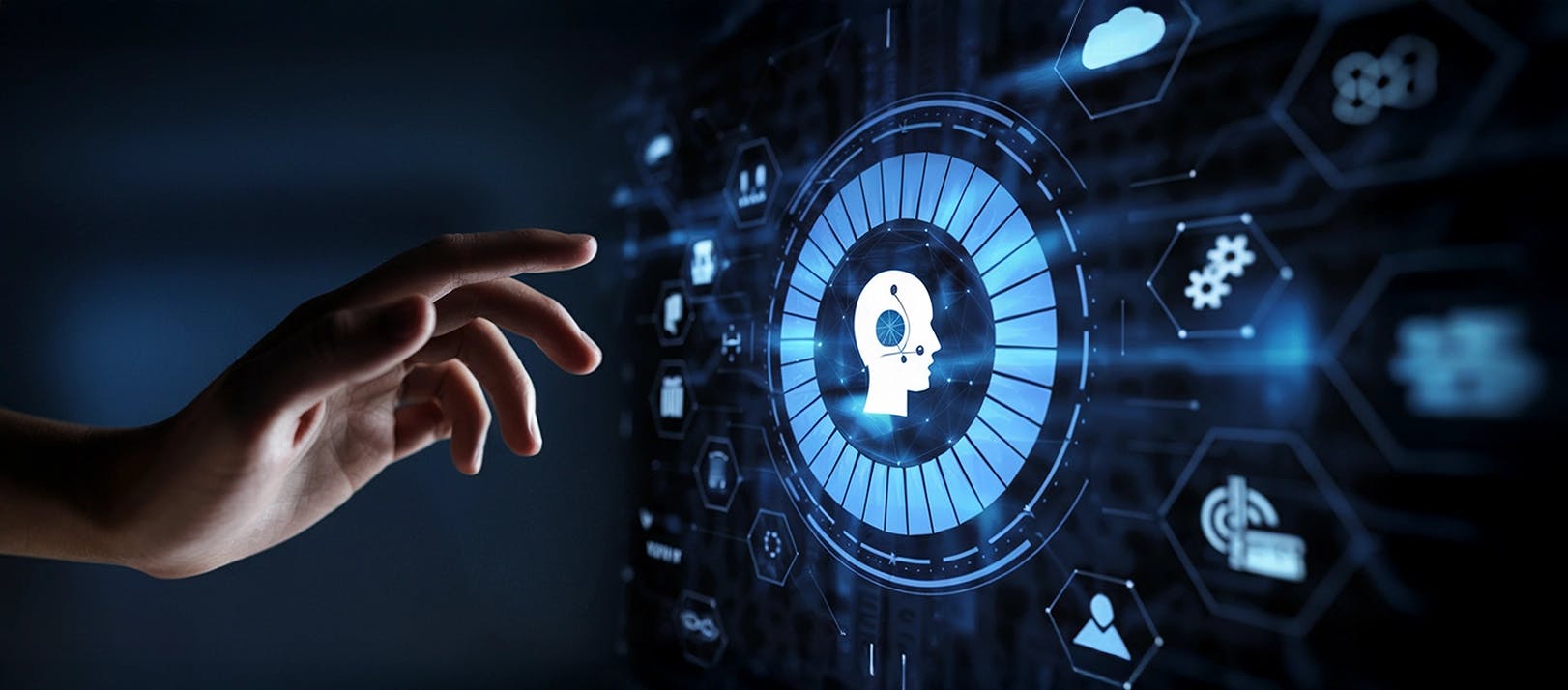
AI in Customer Service: Trends & Predict...
Know more
A Deep Dive into How Agentic RAG Automat...
Know more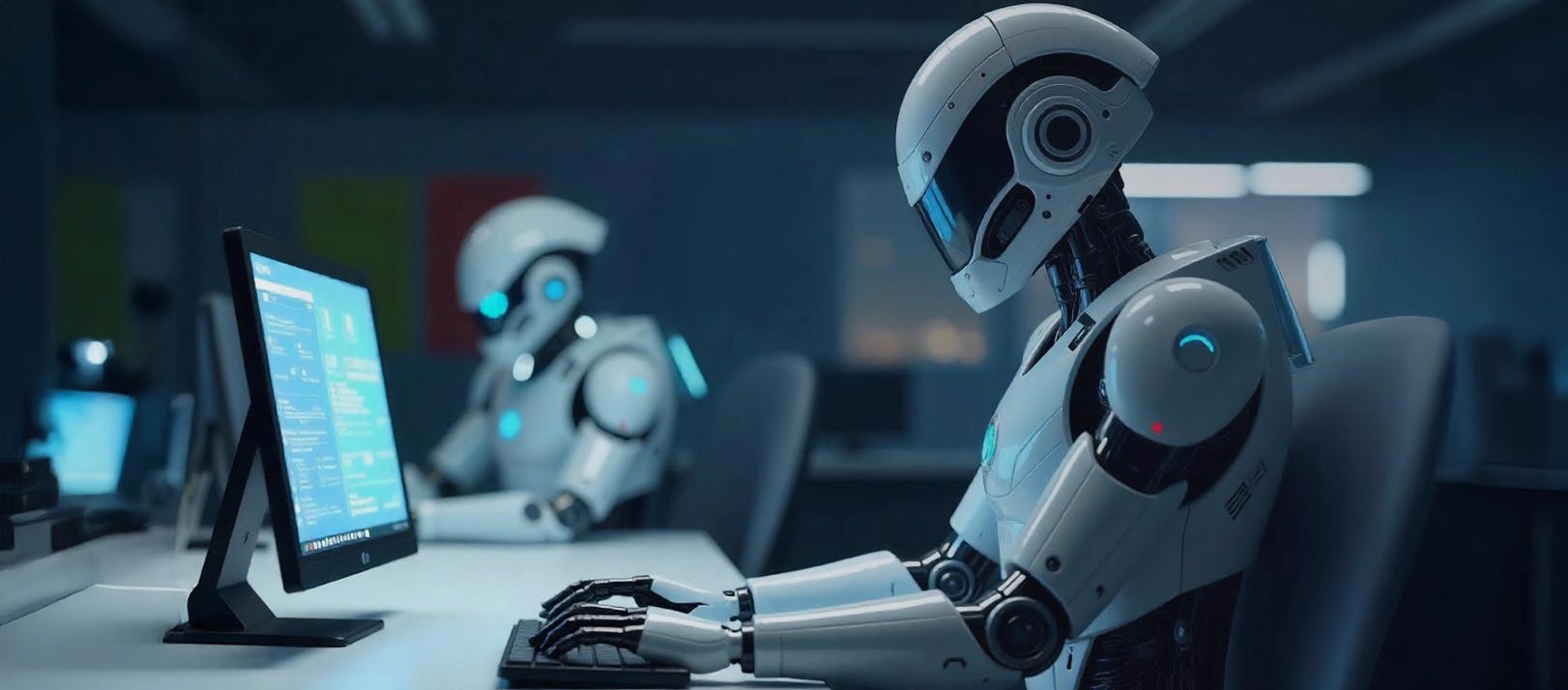
Is Agentic RAG Worth the Investment? Age...
Know more